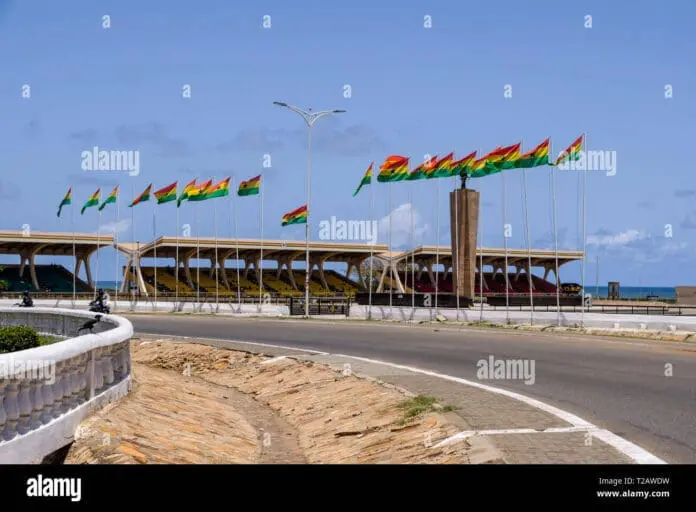By Ghana News
Copyright ghanamma

Ghana’s tourism sector recorded an extraordinary revenue surge of GH¢15.42 billion from 901,448 international visitors during the 2022/2023 period, according to groundbreaking findings from the Ghana International Travellers’ Survey (GITS) released by the Ghana Statistical Service (GSS).
The comprehensive survey data, unveiled strategically around World Tourism Day, reveals a tourism landscape primed for unprecedented growth as the country positions itself as Africa’s premier cultural destination through ambitious new initiatives including the recently launched Black Star Experience program.
Professional travelers demonstrated the highest expenditure rates, while American visitors showed the strongest per capita spending patterns, indicating Ghana’s growing appeal to high-value international markets. The survey period from October 2022 to September 2023 captured critical baseline data that tourism officials describe as transformative for sector planning.
Same-day visitors contributed GH¢24 million to the total, while overnight visitors generated the substantial majority at GH¢15.18 billion. This spending breakdown reveals the economic potential of extending visitor stays and enhancing overnight tourism experiences across the country.
The visitor demographics paint a compelling picture of Ghana’s tourism market. Males consistently outnumbered females across all age groups, with adults between 36 and 64 years forming the largest segment. The third quarter of 2023 recorded peak visitor numbers, particularly among male overnight travellers in the prime demographic bracket.
Cultural and heritage attractions emerged as primary draws for international visitors. Top destinations included Bisa Abrewa Museum, Cape Coast Castle, Kwame Nkrumah Memorial Park, Independence Square and the Arts Centre, and the National Museum. These sites consistently attracted visitors throughout the survey period, demonstrating Ghana’s strong cultural tourism foundation.
Travel patterns revealed interesting insights about visitor motivations. For same-day visitors, transit travel dominated most quarters, though the final quarter of 2022 saw nearly half visiting for holidays and leisure activities. This pattern shifted dramatically by the third quarter of 2023, suggesting evolving regional travel dynamics.
Overnight visitors primarily travelled to visit friends and relatives, underscoring the significant role of Ghana’s diaspora in driving tourism revenue. Business and professional travel peaked during the fourth quarter of 2022, highlighting Ghana’s growing importance as a regional business hub.
Regional connectivity played a crucial role in visitor flows. Côte d’Ivoire consistently ranked as the top source for same-day visitors from West Africa, though Liberia emerged as the leading source country during the third quarter of 2023, indicating shifting regional travel patterns.
The survey methodology encompassed key entry and exit points including Kotoka International Airport, Aflao, Paga, and Elubo land borders, plus Tema and Takoradi seaports. Officials employed systematic random sampling and face-to-face interviews to ensure data reliability and accuracy.
Tourism industry stakeholders view these findings as validation of Ghana’s strategic positioning efforts. The data emerges as the country implements its 15-Year Tourism Development Plan spanning 2013-2027, with the Black Star Experience serving as a flagship initiative under the current administration’s economic transformation agenda.
Government officials have outlined ambitious recommendations to capitalize on these findings. For same-day tourism, authorities plan launching a “Visit Ghana in a Day” campaign targeting regional short-haul travellers. Complementary investments in border and seaport facilities aim to enhance visitor experiences and processing efficiency.
Private sector operators face encouragement to develop ready-made one-day itineraries and loyalty packages, while development partners receive calls to support local tourism packaging initiatives. These recommendations reflect a comprehensive approach to tourism development spanning public and private sectors.
Overnight tourism presents even greater opportunities, with recommendations focusing on targeted campaigns for high-spending markets including diaspora communities, business travellers, and those visiting relatives. Leveraging the Economic Community of West African States (ECOWAS) free movement framework could unlock significant cross-border package potential.
The private sector gains specific guidance on expanding shopping, dining, and festival offerings while investing in affordable accommodation options. Development partners receive encouragement to support a National Tourism App rollout and provide virtual guide tools alongside multilingual help desks at entry points.
Tourism officials expect these findings to provide critical baseline data for policy formulation, strategic planning, and investment decision-making as Ghana seeks to maximize its tourism industry’s economic potential. The data arrives as the country implements comprehensive tourism development initiatives designed to establish tourism as a primary driver of job creation, economic growth, and cultural promotion.
The survey’s timing coincides with Ghana’s broader economic positioning efforts as the country works to enhance its global profile as a competitive and sustainable tourism destination. Industry analysts suggest the recommendations could attract significant private investment into tourism-related infrastructure and services.
Early indicators suggest the sector already contributes substantially to Ghana’s economy, though officials stress the need to expand visitor spending, diversify tourism experiences, and ensure equitable access across all market segments. These strategic priorities align with international best practices and Sustainable Development Goal 8.9, promoting sustainable tourism development.
The Ghana Statistical Service designed the survey as a cornerstone for developing the country’s first Tourism Satellite Account (TSA), which should better capture tourism’s true contribution to Gross Domestic Product (GDP). This accounting framework aligns with international standards and provides more accurate economic impact measurements.
As Ghana advances its tourism development agenda, these survey findings offer unprecedented insights into visitor behavior, spending patterns, and market preferences. The data provides tourism operators, government agencies, and development partners with evidence-based guidance for strategic investments and policy interventions designed to maximize the sector’s economic impact while ensuring sustainable growth.



